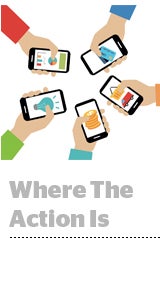 App users that don’t convert or engage in some way are not healthy for a developer’s bottom line.
App users that don’t convert or engage in some way are not healthy for a developer’s bottom line.
On Monday, Facebook rolled out a product to help publishers attract users that are most likely to keep using an app after they download it.
Facebook also expanded dynamic product ads and its full-screen mobile ad unit, Cavas, to make them available to publishers looking to drive app installs and engagement.
“Installs are great, but developers don’t care about bringing in people if they’re not the right people,” said Jehan Damji, a product manager at Facebook.
Who those right people are will vary a bit from app to app – a travel app wants people to complete a booking, a gaming app wants people to complete a level – but the core need remains the same from developer to developer, and that’s “customers who will engage with their product over the long term,” Damji said.
Because app retention rates are in the pits. According to Localytics, three-quarters of app users say sayonara within 90 days across all industries and regardless of vertical.
“If that’s the case, then not all installs are created equal,” said Damji. “Some are better than others.”
It helps that Facebook has access to vast troves of user data across its main app, Instagram and the Facebook Audience Network. Facebook looks for cohorts of users with similar traits and characteristics to those who have previously taken action in a particular app.
“We look at historical data and try to predict whether someone will actually complete an action that’s going to be valuable to that advertiser,” Damji said. “The fact that we have a lot of people on our platform allows us to find people who are similar to these high-value customers that advertisers are looking for.”
But generating installs with high lifetime value is still a tough road. Research released by SensorTower in June found that the average smartphone user in the US downloads exactly zero new apps per month.
“It’s hard to get people to find your app, use it and continue engaging with it,” said Sucharita Mulpuru-Kodali, VP and principal analyst at Forrester. “Facebook helps [with] some of that, and much better than, say, Apple, but it’s still hard for small companies to get a reasonable number of app installs, much less engagement.”
App install ads have been super lucrative for Facebook, but there’s also a certain irony in the fact that app developers are competing for a smaller and smaller slice of a pie that’s also dominated by the duopoly. The vast majority of time spent on mobile may be in apps – but it’s within a few very specific apps, namely offerings from Facebook and Google.
Not that the app economy needs to pull down the shutters just yet.
“We’ve been asking the question for some time: Do apps go away, do they get de-prioritized, does everyone start borrowing Facebook’s mobile moments?” said Mulpuru-Kodali. “But for lots of mobile-first companies, apps still are critical, and that is the type of company that Facebook will really be able to help here.”
Poshmark, for example, a social commerce site where users can buy, sell and share outfits, saw a 24% decrease in its cost-per-event after using Facebook to find the users most likely to make a purchase.
For a business like Poshmark, which is highly dependent on its app, only paying for actions that generate an in-app engagement is a huge benefit, said Mulpuru-Kodali.
“But the bigger question for many other types of retailers,” she said, “is: How do you get any engagement, mobile or otherwise?”











